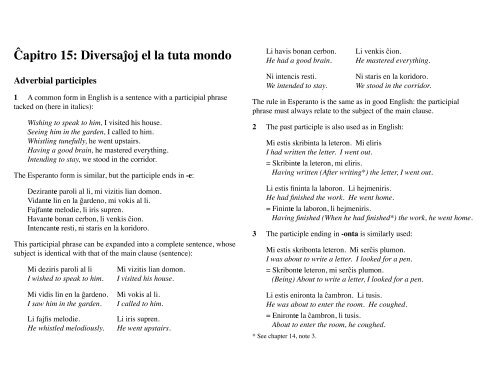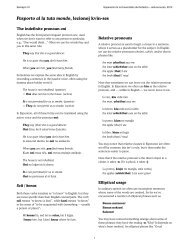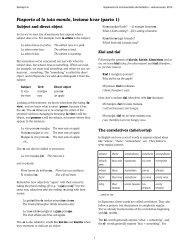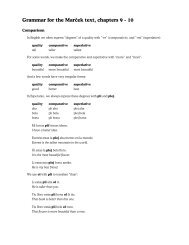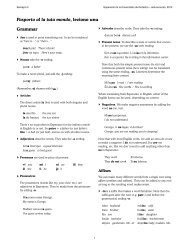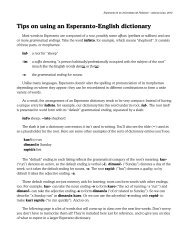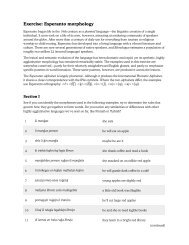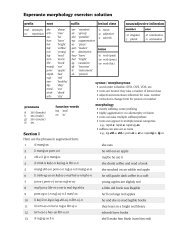The alphabet and pronunciation - Lodestone
The alphabet and pronunciation - Lodestone
The alphabet and pronunciation - Lodestone
- No tags were found...
Create successful ePaper yourself
Turn your PDF publications into a flip-book with our unique Google optimized e-Paper software.
!apitro 15: Diversa"oj el la tuta mondoAdverbial participles1# A common form in English is a sentence with a participial phrasetacked on (here in italics):! Wishing to speak to him, I visited his house.! Seeing him in the garden, I called to him.! Whistling tunefully, he went upstairs.! Having a good brain, he mastered everything.! Intending to stay, we stood in the corridor.<strong>The</strong> Esperanto form is similar, but the participle ends in -e:! Dezirante paroli al li, mi vizitis lian domon.! Vidante lin en la "ardeno, mi vokis al li.! Fajfante melodie, li iris supren.! Havante bonan cerbon, li venkis #ion.! Intencante resti, ni staris en la koridoro.This participial phrase can be exp<strong>and</strong>ed into a complete sentence, whosesubject is identical with that of the main clause (sentence):! Mi deziris paroli al li! Mi vizitis lian domon.! I wished to speak to him.! I visited his house.! Mi vidis lin en la "ardeno.! Mi vokis al li.! I saw him in the garden.! I called to him.! Li fajfis melodie.! Li iris supren.! He whistled melodiously.! He went upstairs.! Li havis bonan cerbon.! Li venkis #ion.! He had a good brain.! He mastered everything.! Ni intencis resti.! Ni staris en la koridoro.! We intended to stay.! We stood in the corridor.<strong>The</strong> rule in Esperanto is the same as in good English: the participialphrase must always relate to the subject of the main clause.2! <strong>The</strong> past participle is also used as in English:! Mi estis skribinta la leteron. Mi eliris! I had written the letter. I went out.! = Skribinte la leteron, mi eliris.! Having written (After writing*) the letter, I went out.! Li estis fininta la laboron. Li hejmeniris.! He had finished the work. He went home.! = Fininte la laboron, li hejmeniris.! Having finished (When he had finished*) the work, he went home.3# <strong>The</strong> participle ending in -onta is similarly used:! Mi estis skribonta leteron. Mi ser#is plumon.! I was about to write a letter. I looked for a pen.! = Skribonte leteron, mi ser#is plumon.! (Being) About to write a letter, I looked for a pen.! Li estis enironta la #ambron. Li tusis.! He was about to enter the room. He coughed.! = Enironte la #ambron, li tusis.! About to enter the room, he coughed.* See chapter 14, note 3.


